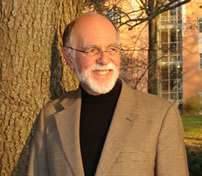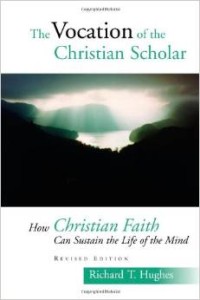We conclude our guest series from Richard Hughes on the vocation of Christian scholars. The following post is adapted from Richard’s book, The Vocation of a Christian Scholar: How Christian Faith Can Sustain the Life of the Mind (Eerdmans, 2005).

Ever since I entered my doctoral program at the University of Iowa in 1967, I have committed myself to serious scholarship.
That commitment is so central in my life that some might wonder if perhaps I have conformed my understanding of the Christian faith to the canons of good scholarship rather than the other way around.
The truth is, I find myself in the happy position of believing that many of the values that are central to good scholarship are values that also lie at the heart of the Christian faith.
Shared Values
Take the theme of paradox, for example. Parker Palmer laments the fact that many scholars—indeed, most Westerners in general—tend to think the world apart into true/false, black/white, good/bad, or sacred/secular. On the other hand, Palmer suggests that serious scholars will hold profound truths in paradoxical tension, even when the pressure is great to think them apart.

Happily, the notion of paradox also stands at the core of the Christian gospel—a point I developed at some length in the first of these four posts.
Or again, good scholarship takes seriously the meaning of human finitude and the reality of human limitations. Good scholars are therefore quick to confess that there is much that we misunderstand and much that we simply don’t know. That is precisely why scholars must embrace the search for truth.
But this conviction, so central to good scholarship, is also fundamental to the Christian faith, since Christian faith proclaims that all men and women have fallen woefully short of the glory of the infinite God.
Or again, good scholarship is scholarship placed in the service of humanity, not scholarship that is content to serve its own agenda. Of all people, Christian scholars should have no trouble embracing this understanding of scholarship since we have been taught to give ourselves for the neighbor just as God in Christ has given himself for us.
And finally, good scholarship is skeptical scholarship. It raises questions and doubts the legitimacy of easy answers.
Skeptical Scholarship
Skepticism is a category we have not discussed in previous posts, and precisely at this point, many Christians may find a significant level of tension between scholarship and the Christian faith. After all, does not the Christian faith provide final answers to ultimate questions, answers that must be accepted and embraced?
That, of course, is true. But we must also recall that our ability to comprehend final answers to ultimate questions is meager, indeed. That, too, is a fundamental teaching of biblical faith.
Precisely for that reason, Christians must embrace doubt as a central dimension of belief. The Spanish philosopher Miguel De Unamuno perhaps put it best when he wrote that
[T]hose who believe they believe in God, but without passion in the heart, without anguish of mind, without uncertainty, without doubt, and even at times without despair, believe only in the idea of God, and not in God himself.
It is for this reason that I continue to find central to the task of scholarship the confession made to Jesus by the father of the demon-possessed son: “Lord, I believe; help thou mine unbelief.” (Mark 9:24)
This is perhaps the most important paradox that Christian scholars must embrace if they wish to be faithful to the life of the mind and faithful to their Christian convictions, and to honor both sides of this equation simultaneously.
Indeed, Christian scholars must search diligently for truth and affirm with conviction those things that can be affirmed. But they must also allow the wonders and mysteries of the Christian faith to inspire doubt and, at certain levels, even skepticism. For skepticism and doubt breed questions, and without questions, there can be no life of the mind at all.
Lord, I believe; help thou mine unbelief.
Richard T. Hughes has spent over 40 years working at the intersection of religion and culture in the United States. Under that broad panoply of interests, he has taught and published on (1) the biblical vision of peace and justice, (2) Christianity and America’s self-understanding, (3) the relationship between Christianity and higher education/the life of the mind, (4) the history of Christian primitivism in America, and (5) the history of Churches of Christ in America.
With a Ph.D. in the history of Christianity since 1500, Hughes has taught at Pepperdine University, Southwest Missouri State University, and Abilene Christian University. He currently serves as Distinguished Professor of Religion and Director of the Sider Institute for Anabaptist, Pietist, and Wesleyan Studies at Messiah College in Grantham, Pennsylvania.

These post have been so great for me…thank you